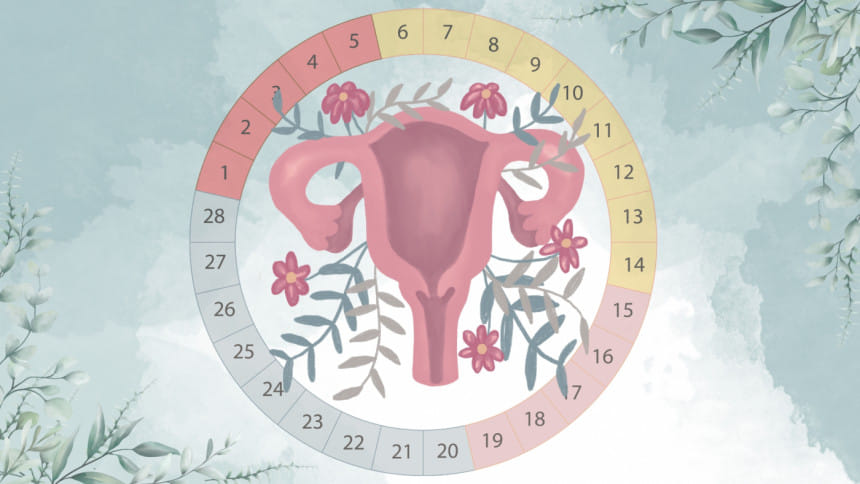The menstrual cycle: Explained

I was always confused about the numerous ways in which one referred to the phenomenon of menstruation as a child. Between discrete terms like "shorir kharap" and "pet betha", and technical terms like menstrual phase and cycles, I was always left in the dark regarding what we actually meant by periods and what are the systems that cause it. I found most of my peers to be equally confused throughout their childhoods as well.
It took a great deal of time, hushed conversations and hidden searches to find out that a period is a monthly occurrence when the lining of the uterus (an essential part of the reproductive system where a foetus develops) sheds, resulting in bleeding over a period of about four to seven days. It took even longer to learn that it is part of the menstrual cycle, which is a hormonal cycle that prepares the body for pregnancy.
So, how does the menstrual cycle work?
The menstrual cycle is usually divided into four phases: follicular, ovulation, luteal, and menstrual phase. These phases are controlled by a variety of hormones. Eggs or ova are the female sex cells that, when they become fertilised by the male sex cells or sperm, allow a pregnancy to take place. Biological females are born with one to two million eggs and, until they hit menopause (when periods permanently stop), their ovaries release one egg per month. Ovaries are an essential organ of the female reproductive system.
During the follicular phase, a hormone named Follicular Stimulating Hormone (FSH) stimulates the production of follicles, which are fluid-filled sacs that contain an immature egg, in the ovary. As the egg matures, this phase also sees an increase in the production of oestrogen hormone in the body which causes the lining of the uterus to start becoming thicker in anticipation that the egg will be fertilised and become implanted on it so that a pregnancy can occur.
The increase in oestrogen triggers the release of another hormone, the Luteinizing Hormone, during the ovulation phase. This causes the mature egg to be released from the ovary into the uterus. This is the time when a person is most fertile and a pregnancy is most likely to occur should sexual intercourse take place.
Following this, in the luteal phase, the body starts producing a hormone called progesterone which makes the uterine lining even thicker in preparation for implantation. If an implantation doesn't occur, the levels of progesterone and oestrogen fall and cause the uterine lining to be shed as there is no need for it anymore as a pregnancy isn't viable.
This lining comes out as blood, mucus, and tissue through the vaginal canal during a menstrual period over three to seven days at a time known as the menstrual phase. Once menstruation ends, the cycle begins from the follicular phase all over again.
Does the menstrual cycle impact how you feel?
Yes! The follicular phase after the end of menstruation is when most menstruators feel energetic and positive. Studies have found menstruators feel happier, more confident, and more clear-minded during this time. During the ovulation phase of the cycle, you might experience your body temperature getting higher, a shift in your mood or appetite, and thicker vaginal discharge. Your senses might also heighten, almost like Spiderman!
If an egg implantation doesn't occur, during the luteal phase, you may experience fatigue, mood swings, bloating, acne, tender or swollen breasts, muscle pain, trouble sleeping, etc. This is known as Premenstrual Syndrome (PMS).
The menstrual phase and periods come with their own set of symptoms, many of which vary widely between different people. Most people are likely to experience abdominal cramps, tender breasts, bloating, mood swings, headaches, nausea, fatigue, body aches, etc. during this time.
Does everyone have the same experience of menstruation?
No. While the above mentioned symptoms are some of the most common ways different symptoms manifest during the menstrual cycle, not everyone experiences the same set of symptoms.
A typical menstrual cycle is 28 days long. However, everyone's body is different, and it may vary from person to person. Many women experience cycles between 21-35 days long, and that's completely normal. You can keep track of yours using a calendar or a period tracker app, but if you experience severely irregular periods, it's best to visit a doctor.
Moreover, if you or anyone you know experience severe pain during periods, it's best to consult a doctor as it may be an indicator of endometriosis, a condition around 10% of women suffer from. Even if you experience pain during periods and it's not endometriosis, seeking out proper pain management medication is crucial as this pain can significantly affect your quality of life.
Everyone experiences different blood flow, duration, and symptoms during periods. To ensure your menstrual health, you must pick a product that you're comfortable with. It's best to avoid scented sanitary napkins or tissue papers and use unscented cotton pads or menstrual cups instead. Cleanliness is a huge factor in preventing infections or other complications. It's also important to get proper nutrition and rest and try to reduce stress during your period if you're feeling down and unproductive.

 For all latest news, follow The Daily Star's Google News channel.
For all latest news, follow The Daily Star's Google News channel. 








Comments